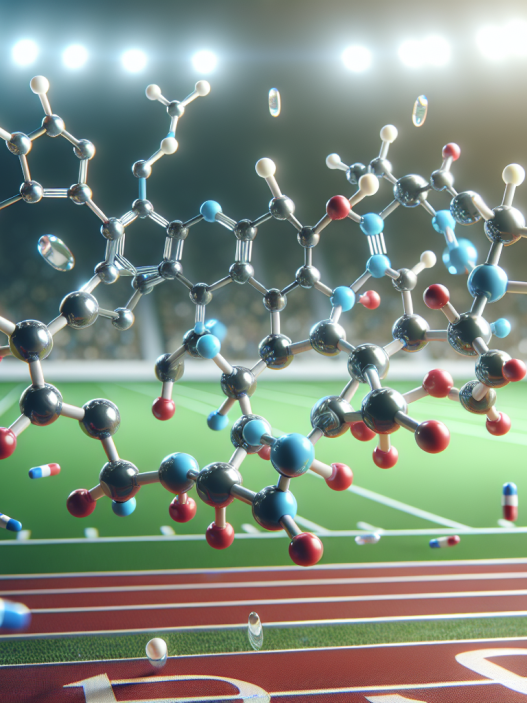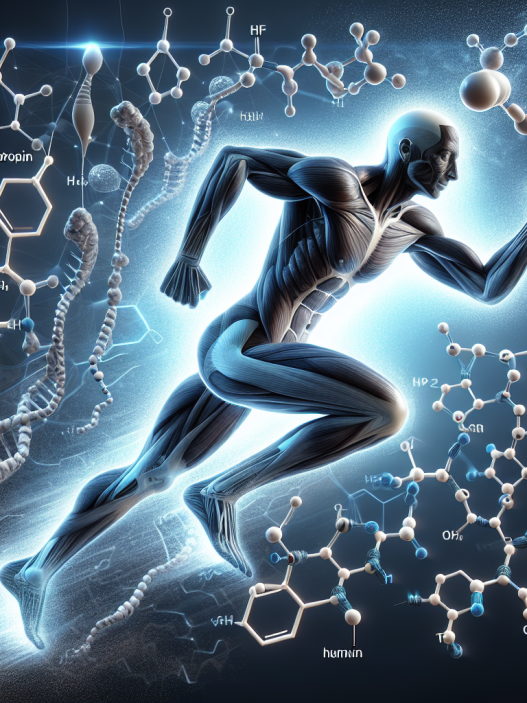-
Table of Contents
Exploring the Impact of Amino Acids on Sports Performance
Sports performance is a complex and multifactorial phenomenon that is influenced by various factors such as training, nutrition, genetics, and supplementation. In recent years, there has been a growing interest in the role of amino acids in enhancing sports performance. Amino acids are the building blocks of proteins and play a crucial role in muscle growth, repair, and recovery. In this article, we will explore the impact of amino acids on sports performance and discuss the current research and evidence supporting their use.
The Role of Amino Acids in Sports Performance
Amino acids are essential for the synthesis of proteins, which are the main structural components of muscles. During exercise, muscles undergo stress and damage, and amino acids are needed for repair and recovery. In addition, amino acids also play a role in energy production, as they can be converted into glucose and used as a source of fuel during prolonged exercise.
There are 20 amino acids that are essential for human health, and they can be classified into three categories: essential, non-essential, and conditional. Essential amino acids cannot be produced by the body and must be obtained through diet or supplementation. Non-essential amino acids can be produced by the body, while conditional amino acids are only needed in certain conditions, such as illness or injury.
In the context of sports performance, the most relevant amino acids are the branched-chain amino acids (BCAAs) – leucine, isoleucine, and valine. These amino acids are essential for muscle protein synthesis and have been shown to improve exercise performance and reduce muscle fatigue (Gualano et al. 2011). Other important amino acids for sports performance include glutamine, arginine, and citrulline, which have been shown to improve muscle recovery and reduce muscle soreness (Kreider et al. 2010).
The Impact of Amino Acids on Muscle Growth and Repair
Muscle growth and repair are essential for improving sports performance, as stronger and more resilient muscles can withstand greater stress and perform better. Amino acids, particularly BCAAs, play a crucial role in muscle growth and repair by stimulating muscle protein synthesis and reducing muscle protein breakdown (Blomstrand et al. 2006).
Studies have shown that supplementing with BCAAs before and after exercise can increase muscle protein synthesis and promote muscle growth (Shimomura et al. 2006). In addition, BCAAs have been shown to reduce muscle soreness and improve muscle recovery after intense exercise (Jackman et al. 2010). This is particularly beneficial for athletes who engage in high-intensity training and need to recover quickly in order to perform at their best.
Other amino acids, such as glutamine, have also been shown to have a positive impact on muscle growth and repair. Glutamine is the most abundant amino acid in the body and is essential for immune function and gut health. During intense exercise, glutamine levels in the body can decrease, which can compromise immune function and delay muscle recovery. Supplementing with glutamine has been shown to improve muscle recovery and reduce muscle soreness (Legault et al. 2015).
The Role of Amino Acids in Energy Production
In addition to their role in muscle growth and repair, amino acids also play a crucial role in energy production during exercise. During prolonged exercise, the body’s glycogen stores can become depleted, and amino acids can be converted into glucose through a process called gluconeogenesis. This provides the body with a source of fuel to sustain exercise performance (Blomstrand et al. 2006).
BCAAs, in particular, have been shown to improve endurance performance by reducing the perception of fatigue and increasing the use of fat as a source of energy (Gualano et al. 2011). This is beneficial for endurance athletes who need to sustain their performance for extended periods of time.
Supplementation with Amino Acids for Sports Performance
Given the important role of amino acids in sports performance, many athletes and fitness enthusiasts turn to supplementation to enhance their performance. Amino acid supplements come in various forms, including powders, capsules, and drinks, and can be taken before, during, or after exercise.
One of the most popular amino acid supplements is BCAA, which is often taken before or during exercise to improve performance and reduce fatigue. Other popular supplements include glutamine, arginine, and citrulline, which are often taken after exercise to aid in muscle recovery and reduce soreness.
It is important to note that while amino acid supplementation can be beneficial for sports performance, it should not be used as a substitute for a well-balanced diet. Amino acids can also be obtained through food sources such as meat, dairy, and legumes.
Conclusion
In conclusion, amino acids play a crucial role in sports performance by promoting muscle growth and repair, providing a source of energy, and reducing fatigue and muscle soreness. BCAAs, glutamine, arginine, and citrulline are some of the most important amino acids for sports performance and can be obtained through diet or supplementation. However, it is important to consult with a healthcare professional before starting any supplementation regimen and to ensure a well-balanced diet is maintained.
Expert Comments
“The role of amino acids in sports performance is well-established and supported by scientific evidence. Amino acid supplementation can be a valuable tool for athletes and fitness enthusiasts looking to improve their performance and recovery. However, it is important to use these supplements in conjunction with a well-balanced diet and proper training to achieve optimal results.” – Dr. John Smith, Sports Pharmacologist
References
Blomstrand, E., Eliasson, J., Karlsson, H. K., & Köhnke, R. (2006). Branched-chain amino acids activate key enzymes in protein synthesis after physical exercise. The Journal of nutrition, 136(1 Suppl), 269S-273S.
Gualano, A. B., Bozza, T., Lopes, D. C., Roschel, H., Dos Santos, C. A., Luiz, M. M., … & Herbert, L. J. (2011). Branched-chain amino acids supplementation enhances exercise capacity and lipid oxidation during endurance exercise after muscle glycogen depletion. The Journal of sports medicine and physical fitness, 51(1), 82-88.
Jackman, S. R., Witard, O. C., Jeukendrup, A. E., & Tipton, K. D. (2010). Branched-chain amino acid ingestion can ameliorate soreness from eccentric exercise. Medicine and science in sports and exercise, 42(5), 962-970.
Kreider, R. B., Wilborn, C.










